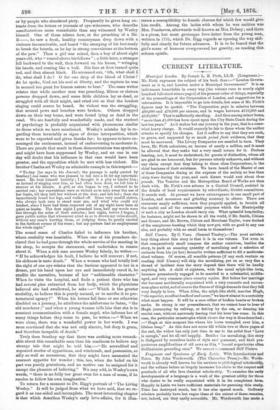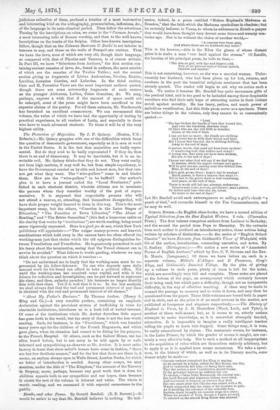Fragments and Specimens of Early Latin. With Introductions and Notes.
By John Wordsworth. (The Clarendon Press.)—Mr. Words- worth is already well known for his services to philological scholarship-,
and the volume before us largely increases his claim to the respect and gratitude of all who love classical scholarship. To examine the early
developments of a language is a work of the greatest utility for those who desire to be really acquainted with it in its completest form. Happily in Latin we have sufficient materials for pursuing this study.
Time has destroyed much, but it has also spared much. Ordinary scholars probably have but vague ideas of the extent of these remains, nor, indeed, are they easily accessible. Mr. Wordsworth has made a judicious collodion of them, prefixed a treatise of a most instructive and interesting kind on the orthography, pronunciation, inflexions, &c., of the language in its ante-classical period. Then follow the selections. Passing by the inscriptions on coins, we come to the "Carmen Arvale," a most interesting relic of Roman worship, and then to the well-known inscriptions on the tombs of the Scipio& Other less-known inscriptions follow, though that on the Columna Rostrata C. Dailii is not inferior in interest to any, and those on the walls of Pompeii are curious. Then we have the laws, none of which are very old, though their language, ss compared with that of Plautus and Terence, is of course archaic. In Part III. we have "Selections from Authors," the first section con-
, taming ancient remains of laws, &c., found in authors, the most notable of which are the remains of the Twelve Tables ; and the second section giving us fragments of Livius Andronicus, Na:vius, Ennius, Lucilius, Lutatius Catulus, and Laborius. In the tbird section, Cato and M. Terentius Verso are the most important authors quoted, though there are some noteworthy fragments of such orators as the younger Africanus, Lailius, Cahn Gracchus, &c. We may, perhaps, express a wish that if the amount of space could not be enlarged, some of the prose might have been sacrificed to the superior claims of the poetry. For all these extracts, Mr. Wordsworth has furnished an excellent commentary. We can recommend this volume, the value of which we have had the opportunity of testing by practical experience, to all readers of Latin, and especially to those who have to teach advanced students. To those it will be of the very highest utility.



































 Previous page
Previous page